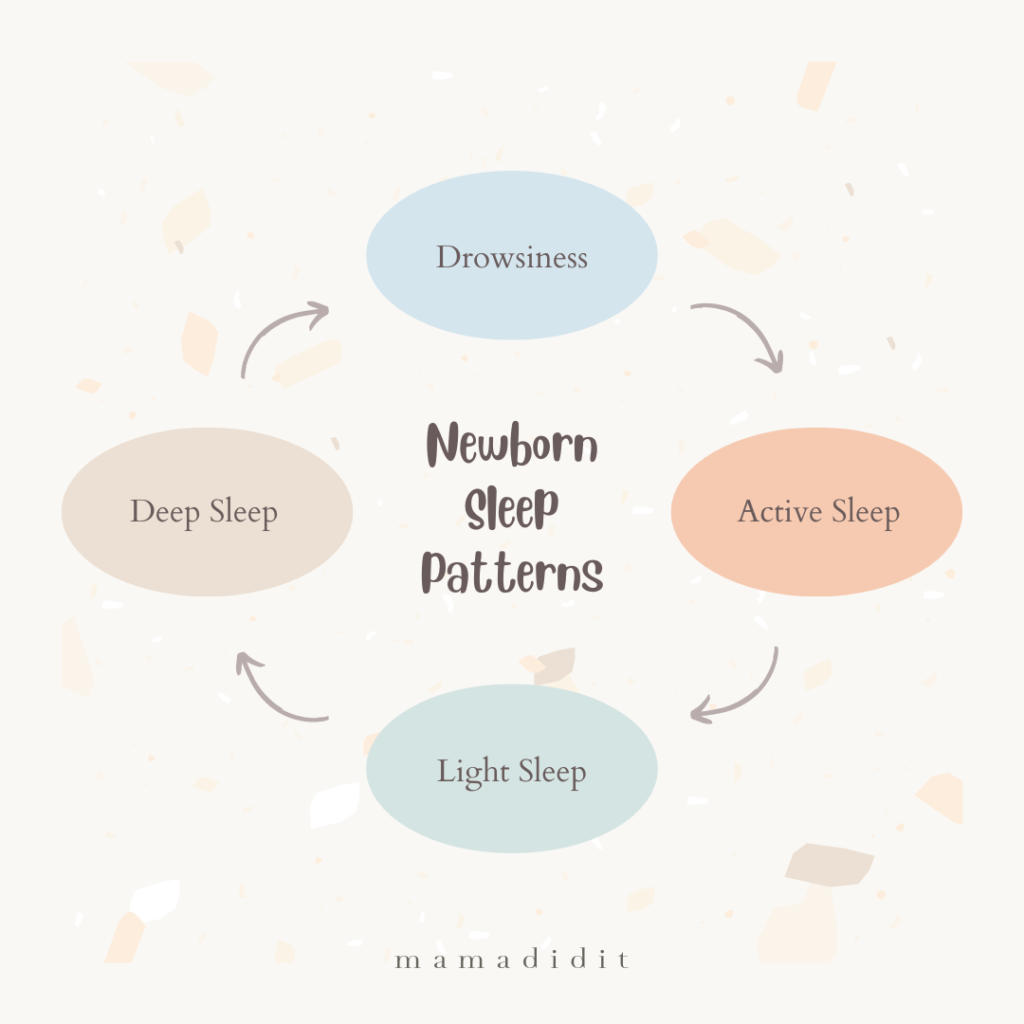A postpartum nurse answers the question, “Is my newborn baby sleeping too much?” Here’s how you can tell.
It’s no secret that newborn babies sleep a lot. New parents often wonder how much is too much and if their baby is feeding enough. “Is my newborn baby sleeping too much? A postpartum nurse weighs in.
It can be tough to tell if your baby is doing what they should be. And it makes it tougher to wade through the countless amount of info you receive from friends, blogs, and even medical professionals. If you feel concerned, it’s important to refer to the 5 questions below to get some answers about your newborn’s sleep.
The most common misconceptions I hear from new parents are:
“If he’s sleeping, I should let him sleep.”
“She will wake up if she’s hungry.”
Well, not quite.
Is my newborn baby sleeping too much?
It can be TOUGH to get a newborn to nurse the first couple of days of life. Many new moms mistakenly think that they must not need to nurse if their baby isn’t eager to feed. Here’s the truth. Newborns need to nurse every two to three hours. The first couple of days, they don’t FEEL hungry because they are still using supplies from the womb.
They still need to eat though. This helps them maintain temperature, regulate body systems, and establish mom’s milk supply. Around day two after birth, your newborn’s appetite will likely change and they will wake up more easily and be eager to nurse when it’s time. A sleepy baby the first two days after birth is common.
Until solid foods are introduced, breastfed babies need to be fed 8-12 times in 24 hours. Most pediatricians do not recommend introducing solids until 6 months of life. If your baby regularly sleeps for longer than four-hour stretches and you often have to wake them to feed, give your healthcare provider a call. This can be a sign that they are not getting enough calories, mom’s milk supply may have diminished, and they are conserving energy.

Is my newborn baby sleeping too much?
Most professionals agree that the newborn stage lasts until four weeks. Some say 4-8 weeks. Your newborn will get a lot of sleep in a 24-hour period. Newborn babies typically get 16-18 hours of sleep, with needing to wake every 2-3 hours to feed, according to the American Academy of Pediatrics and the National Sleep Foundation. Their awake time will slowly grow as they get older, and they will sleep for longer stretches.
Older infants (4-11 months old) usually sleep 14-17 hours every 24 hours. At this point, a bedtime routine may help your baby regulate their internal biological clock and sleep longer spurts during the night.
Even though your newborn is getting much sleep, you probably aren’t. For the first couple of weeks, you are learning all about your baby as they are learning all about the world. They usually sleep in short bursts, sometimes only 20 minutes at a time, so the amount of sleep a new parent gets in the first month can be minimal.
Baby’s Sleep Patterns
A first-time parent may be surprised by their newborn’s sleep patterns. You will find that there are four different stages of a newborn sleep cycle. Newborn sleep patterns may be cycled through as quickly as 20 minutes.
Drowsiness
Much like adults, babies will get droopy eyes and yawn when they begin to feel tired. When this happens, they are ready for a nap.
Active Sleep
This infant sleep pattern is REM sleep. Your baby will jerk and you may be able to see their eyes moving beneath their lids. Their breathing will be irregular and they may stop breathing for a few seconds and then begin to breathe again. This is no cause for concern if their coloring looks good.
Light Sleep
Breathing becomes more regular and your baby’s sleep becomes less active. They are easy to wake in this phase but are headed to deep sleep.
Deep Sleep
Here’s where we get the phrase “sleeping like a baby.” In this baby sleep pattern, your baby will be unbothered by noise and bright lights. You could even vacuum around their bassinet, and they likely wouldn’t wake up! In this phase, they are busy developing. Keep daytime lights normal and nighttime sleep calm and dark. Your baby will quickly learn which is which after the first few weeks.

Is my newborn baby sleeping too much?
It’s a good idea to ask yourself these questions if you feel concerned that your newborn baby is sleeping too much or not feeding enough. These questions come straight from my nursing experience and can help you determine if there is a problem. If you are still unsure, check with your doctor.
1. How many dirty diapers is my baby having?
Breastfed babies poop often (usually five times in 24 hours or more). During a growth spurt, it’s normal for them to skip a day of having a bowel movement. This is normal. If your baby goes longer than 48 hours without a poop, give the pediatrician a call.
2. How many wet diapers is my baby having?
Baby’s diapers often need to be changed. By day five, they are expected to wet five times in twenty-four hours. This is a good sign that your baby is hydrated and getting what they need from the breast. If you notice less than this, let your doctor know. Another sign of dehydration is a low volume of urine (wet diapers don’t feel as heavy anymore) or dark urine.
3. Do they weigh more than their birth weight?
Breastfed babies usually lose weight the first couple of days after birth. They quickly level off and begin to gain again. Breast milk supply will increase as mom’s mature milk comes in. By two weeks of age, a baby should be back to their birth weight. Is your baby gaining enough weight? See a lactation consultant, or simply have your partner hold your baby and weigh themselves before feeding and then again after. Compare numbers.
4. Do they feed at least 8 times in 24 hours?
A breastfed baby needs to feed at least eight times in 24 hours. And they may feed up to twelve times in 24 hours. It doesn’t matter if they sleep through a feeding as long as they are making up for it at some point during the timeframe. Bottle-fed babies who are formula feeding needs to be fed every 3-4 hours.
5. How do I know if they are getting enough milk?
Babies have tiny tummies. These small stomachs do grow rapidly in the first month of age. Your baby’s tummy starts out the size of a cherry. By the first week, it’s the size of a ping-pong ball, and by one-month-old, it’s the size of a chicken egg. You can make sure your baby is getting full feeds by seeing a lactation consultant for a pre and post-feeding weigh or simply by having your partner hold your baby and weigh themselves before feeding and then again after. Compare numbers.
The Most Current Safe Sleep Guidelines
When it comes to safe sleep, it’s important to know the facts. Babies who are placed on their backs in a safe sleep space have lower cases of sudden infant death syndrome (SIDS) than others. Always put your baby on their back when you lay them down.
You want a nice, firm mattress for your baby with NO soft bedding. Make sure sheets are fitted and use sleep sacks as safe blankets for your baby. Keep the room temperature around 70 degrees. A comfortable temperature is important to keep your baby from overheating.
Here are my favorite, nurse-approved sleep sacks for your baby.
Is my newborn baby sleeping too much?
If your newborn is regularly sleeping more than 18 hours every 24 hours or feeding less than 8 times in 24 hours, then they are sleeping too much. If this is the case, make an appointment with a lactation consultant to see how your milk supply is doing.
Make sure your baby is having good feedings at least 8 times every 24 hours. If they aren’t waking up on their own for these feeds, then wake them up, even if you have to make them mad. They need the nutrition to continue growing and developing.
You may also like 12 Ways to Increase Your Breast Milk Supply
Post may contain affiliate links
